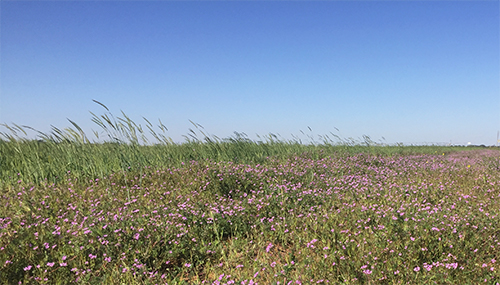"The grant supports research at the crossroads of water scarcity, soil health, climate, meat production, and economic viability of the Texas High Plains. It seeks to answer questions on the subtle effects of soil microbes on controlling the absorption and release of greenhouse gases from pasture soils."
In January 2021, three PSS researchers were awarded a 3-year, $500,000 grant by the United States Department of Agriculture - National Institute of Food and Agriculture (USDA-NIFA). The grant is part of NIFA's Agriculture and Food Research Initiative (AFRI), which is the nation's leading competitive grants program for agricultural sciences to improve rural economies, ensure food safety and security, address water availability issues, and mitigate impacts of climate variability.
The AFRI grant was awarded to PSS's Lindsey Slaughter, Charles West, Sanjit Deb, and Veronica Acosta-Martinez of the USDA-ARS Cropping Systems Research Laboratory for their research proposal titled "Harnessing soil health to mitigate greenhouse gas emissions in semi-arid pasture ecosystems".
"The grant supports research at the crossroads of water scarcity, soil health, climate, meat production, and economic viability of the Texas High Plains. It seeks to answer questions on the subtle effects of soil microbes on controlling the absorption and release of greenhouse gases from pasture soils," says West.
"To create more sustainable agricultural systems, we must understand how both aboveground (plant and animal) and belowground (soil) components interactively regulate soil health and ecosystem processes," says Slaughter. "My goal in this project is to help discover how soil microorganisms in these pastures can be managed to help us offset some of the methane emissions from grazing cattle." To that end, the central hypothesis of the project is that including legumes in pasture mixes will avoid the peaks of plant-available nitrogen in soil typical of nitrogen fertilization, thereby reducing nitrogen competition for enzyme sites and decreasing net CH4 production.
In the long term, the program aims to design management strategies that convert limited water supply into profitable plant and livestock systems while building productive, climate-resilient soils. Additionally, as explained by Deb, "this project will use our field results to develop a computer model that predicts how water supply, fertilization, and grazing management affect greenhouse gases."

The project will take place in West's sustainable pasture experiment system at the New Deal Research Farm, where West and Acosta-Martinez have been collaborating to develop systems for dryland farming and Deb has been studying water and soil management.
For both researchers and the local agricultural community, the relevance and impact of this grant is clear. According to Acosta-Martinez, "Most of the farmers I've talked to are concerned about the next drought and how they can build their soils to cope with this and stay profitable long-term. Research like this helps us plan for the future."
This story has also been featured on Texas Tech Today. See the full feature here.
